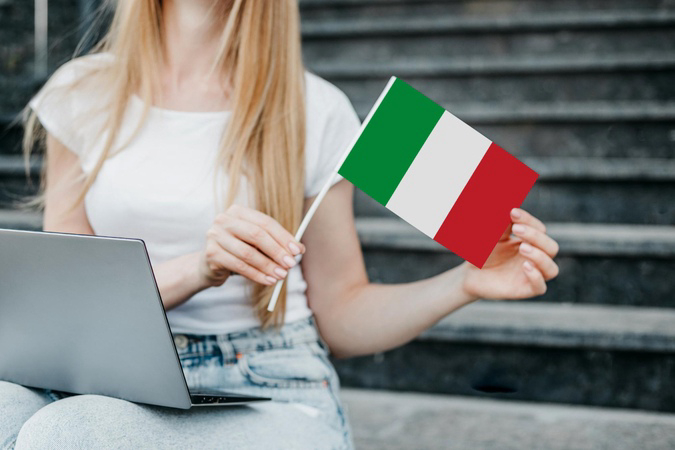Renowned for its boot shape, Italy is a captivating blend of natural beauty, rich history, and vibrant culture. From the majestic Alps to the sunny coastlines, this diverse country offers countless opportunities for exploration and discovery.
Italy boasts some of Europe's oldest universities, with Bologna leading the way since 1088. The country adopted the Bologna system in 1999, allowing students to earn bachelor's and master's degrees in just five years. These historic institutions have cultivated unique student traditions, including the symbolic laurel wreath awarded to graduates and lively student organizations reminiscent of fraternities and sororities.
Studying in Italy is more than just academics. Italians are known for their warm hospitality, and language learners can quickly build strong friendships. Beyond the classroom, students can immerse themselves in art, history, and nature, making Italy feel like a second home.
Italy's Top Universities for International Students
Italy offers a rich tapestry of higher education options for international students. From historic institutions shaping European academia to modern campuses focused on science and technology, there's a university to suit every student's goals.
University of Cagliari: This prestigious university, located in the stunning coastal city of Sardinia, provides a diverse range of programs from business to engineering.
University of Bologna: A pioneer in higher education, Bologna offers a wide array of subjects and boasts state-of-the-art research facilities.
University of Padua: Renowned for its supportive learning environment and global outlook, Padua attracts students from around the world.
University of Milan: With a strong emphasis on STEM subjects, Milan offers students the opportunity to study in a dynamic and innovative city.
University of Turin: A historic institution with a global reputation, Turin provides a strong foundation for academic and professional success.
University of Pisa: Known for its academic excellence and rich history, Pisa offers a range of programs in science, engineering, and business.
University of Florence: Combining tradition with innovation, Florence provides a vibrant campus life and a wide array of humanities and social science programs.
These universities offer a variety of tuition fees, with most undergraduate programs ranging from €1,000 to €5,000 per year. Master's programs typically cost between €1,500 and €8,000 annually.
Note: Specific tuition fees can vary depending on the chosen program and student status. It's essential to check the official university website for the most accurate information.

Applying to Italian Universities
Applying to an Italian university generally involves two main steps: pre-application through the Italian embassy or consulate (for non-EU students) and direct application to the chosen university. Ensure all documents are authentic and complete.
Application Portals
Italy offers centralized and university-specific portals for international students.
- Universitaly: This national platform provides information on courses, admissions, and visas. It's also a pre-enrollment portal for some universities.
- University-Specific Portals: Each university has its own application portal with specific requirements and deadlines.
Application Process by Level
Undergraduate: Pre-enroll on Universitaly, then apply directly to the chosen university. Submit academic documents, language certificates, and other required materials. Some programs may require entrance exams or interviews.
Master's: Check specific program requirements (degree, language proficiency, GRE/GMAT). Apply through the university portal, submitting transcripts, statement of purpose, recommendation letters, and potentially a research proposal or portfolio.
Doctoral (PhD): Apply directly to university departments. Submit a research proposal, CV, transcripts, recommendation letters, and possibly a letter from a potential supervisor. Interviews or oral exams may be required.
Remember, application procedures can vary between universities. Always check the specific requirements of your chosen institution.
Below listed documents should be kept ready before initiating the admission process:
- Application form
- Valid passport or ID card/documents
- Passport size latest photograph
- Duly accomplished pre-enrollment form
- Academic transcripts and certificates
- Resume/CV
- Letter of Recommendation
- Letter of Motivation
- Language Proficiency Score
Standardised test scores if applying for:
- UG: SAT / ACT
- PG: GMAT / GRE
Application Timeline for International Students in Italy
The pre-enrollment process for non-EU students typically takes place between February and July. However, it's essential to confirm exact dates with your local Italian embassy or consulate as these can vary.
Undergraduate (Bachelor's) and Single Cycle Programs
First Session: Applications for undergraduate programs usually open in January and close in February. If required, entrance exams are held in March or April.
Second Session: A second application period might be available, typically opening in July and closing in August, with exams in September.
Graduate (Master's) and PhD Programs
Master's program deadlines can differ from undergraduate programs. Application periods often start in the spring and conclude in late summer or early autumn.
Visa Application
Once you've received an acceptance letter and completed the pre-enrollment process, non-EU students must apply for a study visa. It's advisable to start the visa process as early as possible to allow sufficient time for processing.

Italy Student Visa
Short-Term Study Visa (Type C)
Ideal for brief academic programs like short courses, language programs, or summer schools, this visa allows a stay of up to 90 days in Italy. It cannot be extended or converted into a longer-term visa, and typically doesn't permit work.
Long-Term Study Visa (Type D)
Designed for students enrolled in longer programs such as undergraduate, postgraduate, or PhD studies, this visa permits a stay of over 90 days, renewable annually. It can be converted into a residence permit upon arrival, and part-time work is generally allowed (up to 20 hours per week).
Specialized Visas
Language Courses: A variation of the long-term visa tailored for language students, with duration matching the course length.
Internships or Research: A long-term visa for specific academic placements, with work permissions varying based on the program. These visas can often be renewed.
Note: Visa regulations can be complex and subject to change. Always consult the official Italian government website or your nearest Italian embassy or consulate for the most accurate and up-to-date information.
Italy Tuition Fees & Scholarships
Studying in Italy is significantly more affordable compared to other countries. Tuition fees at public universities in Italy typically range from €500 to €4,000 per year, with the amount varying based on the course and, importantly, your family income. To determine your fee level, you'll need to submit an application for an assessment of your household income, which could result in much lower fees.
Private universities and business schools generally have higher fees. For instance, at Università Bocconi in Milan, tuition fees are around €13,000 per year, while at Università Cattolica Sacro Cuore, also in Milan, they can reach up to €10,000 annually.
Italian universities typically do not charge application fees, although selective programs may require an admission test, which can involve additional costs. For example, admission tests for medical degrees usually range from €25 to €100.
Financing your studies in Italy can be challenging, especially for international students. Fortunately, various options are available to help alleviate this financial burden, including government grants, university scholarships, and external funding.
Italian Government Scholarships
The Italian government offers merit-based scholarships to international students, which can cover tuition fees, accommodation, and sometimes even living expenses. More information can be found on the Italian Ministry of Foreign Affairs and International Cooperation’s website or through the Italian Embassy in your country.
Regional Scholarships
Several Italian regions provide need-based scholarships, administered by the DSU (Diritto allo Studio Universitario) offices within universities. These scholarships often include free meals at university canteens and discounts on public transportation.

University-Based Scholarships
Many universities in Italy offer scholarships based on either merit or financial need. Institutions like Bocconi University, Sapienza University of Rome, and the University of Bologna have scholarship programs that often cover both tuition fees and living costs. Check the scholarship or financial aid sections on university websites for more details.
Commonly Required Documents for Scholarships:
- Passport copy: A clear copy of your passport's identification pages.
- Passport-sized photos: According to the specifications in the scholarship guidelines.
- High school transcripts: For undergraduate scholarship applications.
- University transcripts: Required for postgraduate scholarships.
- Diplomas and certificates: Copies of all relevant academic qualifications.
- Grading scale: An explanation of the grading system from your previous institutions if it differs from the Italian system.
- Language certificates: Proof of proficiency in Italian or English, depending on the course’s language of instruction (e.g., TOEFL, IELTS, or CILS).
- Financial statements: Documents demonstrating your financial situation, such as bank statements.
- Affidavit of support: Required if someone else is funding your education.
- Statement of purpose: An essay explaining your reasons for studying in Italy and how the scholarship will benefit you.
- Letters of recommendation: Usually two or three, from teachers or professionals familiar with your academic or work background.
- Research proposal: Required for research-focused postgraduate programs.
- CV/Resume: Detailed and current, outlining your academic and professional background.
- Work certificates: Proof of employment and relevant experience, if applicable.
Additional Documents:
- Portfolio: Required for art and design courses.
- Audition tape: Necessary for music and performing arts programs.
- GRE/GMAT scores: For some business and management programs.
Official Translations:
Sworn translations: Some documents may need to be translated into Italian by a certified translator.
Proof of previous scholarships: Some scholarship programs might require documentation of any scholarships you have previously received.
Special Requirements:
Medical certificates: Needed for some scholarships, particularly those related to sports.
Criminal record certificate: Required by some programs.
Housing & Living Costs in Italy
The monthly cost of living in Italy as an international student can vary greatly depending on factors such as the city you live in, your lifestyle, and how often you eat out. Generally, you’ll need between €900 and €1,300 per month to cover expenses like rent, food, transportation, and entertainment.
Rental prices vary significantly across different cities. Rome, Milan, and Venice are known for their higher costs, while cities like Naples, Pisa, and Genoa are more affordable. Here are some examples:
- In Rome, you can find rooms for €500-650 per month, plus utilities.
- In Bologna, rent for a room is typically around €400-500 per month, excluding utilities.
- In Venice, room prices are similar to those in Rome and Bologna, with shared rooms in Mestre (the mainland part of the city) sometimes available for €300-350. Living in Mestre means you'll need to budget for a travel card to reach the campus (but gondolas aren’t included!).
- In Milan, rooms usually start at €500 per month, with most costing around €550-600, plus bills.
- In Pisa, most rooms range from €350-500 per month.

Grocery expenses depend largely on your shopping habits and where you shop. Discount supermarkets in residential areas are less expensive than small convenience stores in city centers. Expect to spend around €250 to €350 per month for a comfortable student lifestyle.
Dining out doesn't have to be costly: a meal at a pizzeria might cost €10-€15, and breakfast at a café around €3.
Public transportation is relatively affordable, especially with student discounts. Monthly passes cost around €25, while annual passes can be purchased for €200 to €250 with a small discount.
Medical appointments in Italy are free through the national health service, the *Servizio Sanitario Nazionale* (SSN). Italy’s national health system is of high quality and provides various services, including doctor visits and some hospital appointments and procedures, including emergency services, at no cost.
EU students can either join the national health service free of charge or use their European Health Insurance Card (EHIC) from their home country. Non-EU students will need to pay an annual fee for health insurance, but it's relatively inexpensive at around €150 per year.
Conclusion
Italy is more than just a top tourist destination. With its prestigious universities, an increasing number of English-taught programs, and affordable tuition fees, this remarkable country is a must-consider for any international student. In this ApplyMoon article, we aimed to cover all aspects of studying in Italy.
